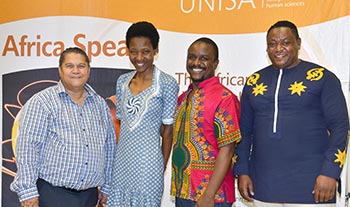College of Human Sciences
“Native Question” is an equation: y = f(x)
The College of Human Sciences hosted its first Africa Speaks lecture for 2017 on 08 February at Unisa’s Kgorong Function Hall.

Pictured are Prof. Andrew Philips (Executive Dean: College of Human Sciences), Prof. Puleng Segalo (Head of Research and Graduate Studies, College of Human Sciences), Prof. Nyasha Mboti (Head of Communication Studies, University of Johannesburg), and Prof. Kgomotso Masemola (Department of English Studies, Unisa).
Programme director, Professor Kgomotso Masemola, from the Department of English Studies welcomed management and students, saying Africa Speaks was a special occasion for Unisa because it shows that the university has a footprint in Africa and that we engage the best scholars.
Professor Masemola then introduced and welcomed the speaker Professor Nyasha Mboti, an associate professor and Head of Communications Studies at the University of Johannesburg.Professor Mboti’s presentation was entitled Y=f(x) When Hosts Depend on Parasites – Towards a New Forensics of the “Native Question”. His keen interest in academia, he said, is to ask questions that people do not normally intend or think to ask, adding that knowledge is not finding whatever is put there to be found but, rather, knowing what is ordinarily not to be known.
Professor Mboti began the Africa Speaks lecture by asking the colleagues to join him in singing African songs. Additionally, before presenting his speech he asked the audience to raise their hands and answer the following questions below.
- Is it possible that nine tenths of Africans are dirt poor when their continent hosts such wealth?
- Can hosts depend on parasites?
- Can one steal in such a way that the result is not theft? Is there such a way?
- Can good come out of evil? Can they merge and ally?
- Is a Mandela-Rhodes Foundation possible?
- Can blood money be laundered clean?
- Can a molester-thief share his victim’s pain? Can they conjoin and share interests?
- Can history be laundered?
- Can truth be laundered, like blue jeans, until it is no more?
- Can a paedophile have the interests of children at heart?
- Can democracy follow rape, theft and genocide?
- Should the molested and abused compensate their molester-abusers?
- Does use preclude abuse?
- Can war end war?
- Can a thing be where it is not? Can a thing not be where it is?
- Can a three-year old girl from Alexandra, in the year 2016, climb a tree with her father to escape a flooded shack, and fall into the Jukskei river, and drown?
- Is Africa a crime scene?
- Can statues be made to commemorate psychopaths?
He said most analyses of modernity and its genealogies of slavery, empire, and colonialism, have hardly grappled with the notion of the Native Question as a theoretical construct. He proposes refurbishing the notion of the native question for contemporary use. “If we can define the Native Question, we would have gotten some way towards revealing the heart of persistent coloniality: why things are the way they are today.”
He said the Native Question is, at heart, an equation: y = f(x). In an equation or graph, the thing that is affected (y) is the dependent variable. The thing that does the affecting (x), on the other hand, is the independent variable. One cannot, for example in a scientific experiment, have a dependent variable without an independent variable. The expression f(x) indicates that x is the input: it is that which changes the being of the other. The thing y, inversely, is the output: y’s being is always the outcome of x’s presence and action.
He showed, through a variety of examples, from Malcolm X’s notion of the House/Field Negro to Frantz Fanon’s Coloniser’s/Colonised Town, how we can recognise the Native Question/Native Equation as the algorithm that lies at the heart of empire, colonialism and modernity itself. Through anew forensics of the “Native Equation, he hopes to help us understand how, for instance and in today’s world, hosts are fated to depend on parasites, why things are where they are not, why things are not where they are, how one may, for instance, steal without the outcome being theft abusus non tollit usum (abuse won’t preclude use/abuse is use).
Following Mboti’s lecture, Unisa decolonial scholar from the Department of Political Sciences, Professor Tendai Sithole, said the native question demanded a study which is a black study. This is a study of the idea of the proper which means they name things the way they are, we can’t hide Y=X because they are conceived. He said he would like to leave this Y=X to the mathematicians and he proposed that things should be named the way they are.
*By Ian Mabaso (CHS communications and marketing)
Publish date: 2017/03/13

 Unisa co-hosts G20 community outreach in the Eastern Cape
Unisa co-hosts G20 community outreach in the Eastern Cape
 Unisans gain membership of prestigious science academies
Unisans gain membership of prestigious science academies
 Advocating for disability transformation through servant leadership
Advocating for disability transformation through servant leadership
 Unisa Press continues to illuminate the publishing space
Unisa Press continues to illuminate the publishing space